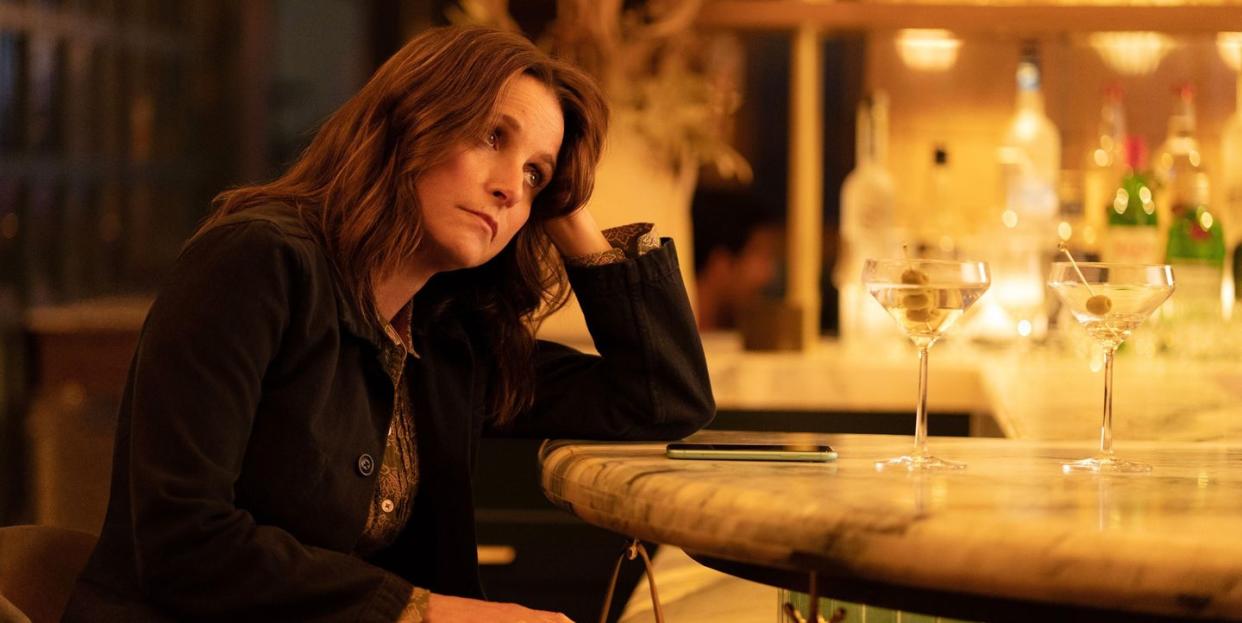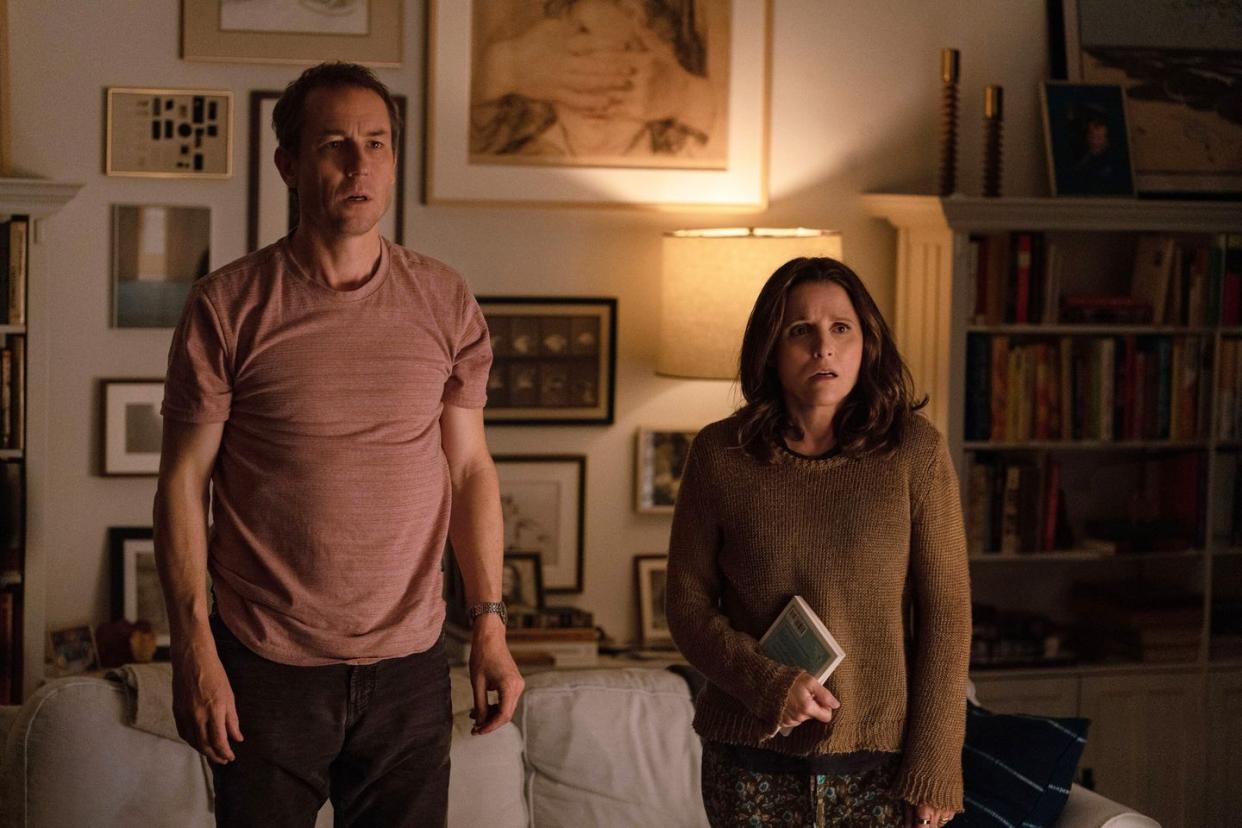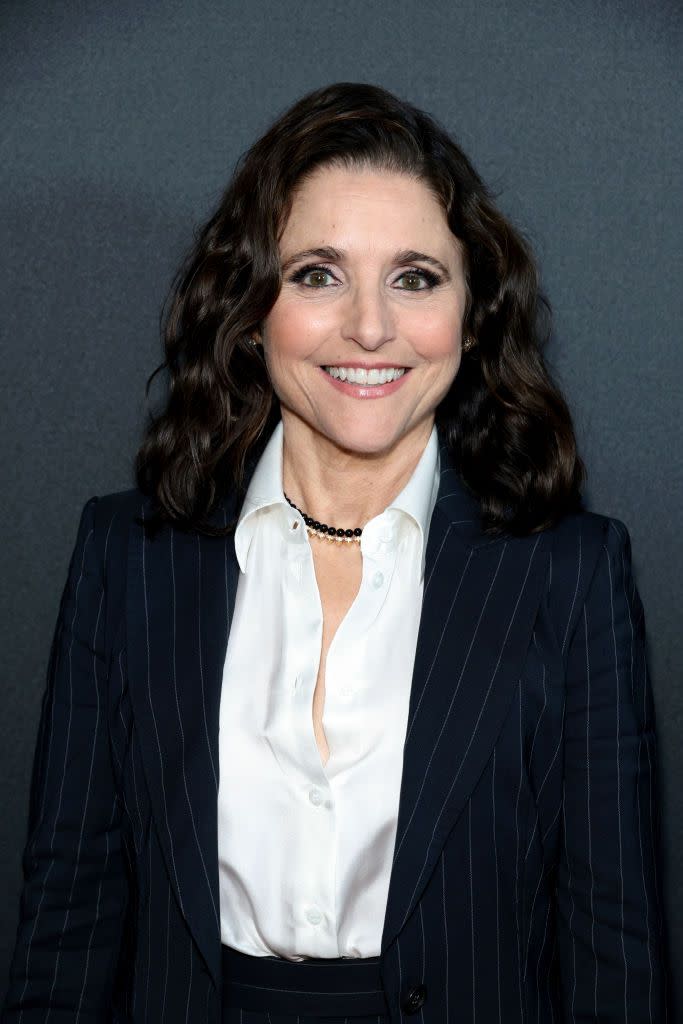Julia Louis-Dreyfus Knows to Trust Her Gut

“How is it that we have only just met each other?” Julia Louis-Dreyfus remembers asking Nicole Holofcener the first time she collaborated with the writer-director, on 2013’s Enough Said.
The two instantly bonded during that shoot, like long-lost friends who’d finally reunited, Louis-Dreyfus tells Bazaar.com on a recent phone call. “It felt as if we had an immediate like-mindedness, as if we’d known each other all our lives. We’ve been dying to get together ever since to work on another movie.”
That finally came to pass a decade later, in the form of You Hurt My Feelings, which premiered at January’s Sundance Film Festival to rapturous reviews and was released in theaters by A24 on May 26. The actor and the director’s simpatico sensibilities are once again palpable in this new relationship dramedy. After all, Holofcener’s signature humor and complex urban characters have always been adorned with an effortlessly relatable sense of vulnerability—the kind that hangs just right on Louis-Dreyfus.
Instantly loveable, often hilarious and enriched by generations of memorable New York personalities, You Hurt My Feelings follows Beth, an author and teacher whose world turns upside down when she accidentally overhears her husband (Tobias Menzies) being critical of her latest book in search of a publisher. Below, Louis-Dreyfus discusses her approach to Beth and the notion of honesty, working with Holofcener, as well as her artistic process and priorities.
It’s interesting that both Enough Said and You Hurt My Feelings start with a little lie that gets out of hand.
I have thought about that. It's a theme that obviously intrigues Nicole, which is about truth-telling in relationships and where does truth begin, how do we find it and where does a lie begin and should we end it? That's obviously over-simplistic, but certainly there is a Venn diagram where these movies have an intersection. There's no doubt about it.
Do you think that honesty is always the best policy in a relationship?
Here's what I think: Honesty-ish is always the best policy. So yes, of course I believe in honesty, but there are circumstances in which there's a nuance to honesty. And by the way, I'm talking about subtle things, not big things.
You are a creator and artist yourself, and anyone who creatively puts themselves out there perhaps has a need for approval. Was that your first connection point to Beth?
Before Nicole had even written it, we would periodically get together to have lunch or dinner. And she pitched me the gem of the idea of a happily married [couple] in which one spouse discovers that her partner has not been telling her the truth [of his opinion] at all, about what she does work-wise. I was immediately intrigued and wanted to be a part of it, because it spoke to me as a creative person and as somebody who has been in a marriage for a very long time; as somebody who very much relies on my husband’s opinion and comments on any project that I’m doing.
What’s your greatest fear as an artist, other than the disapproval of a loved one?
I don’t live in that place very much, but I guess my fear would be similar to anybody’s fear, and that’s called failure. There’s a lot of risk that you must take as an artist, and you even have to do things that are frightening because they may not work out. And that’s true in both comedy and drama. You really have to be willing to step into the danger zone. And inherent in that exercise or action is the risk that you will fail terribly. And if you’re putting your heart and soul into whatever it is you’re doing, that failure feels personal. And that’s the trick, certainly as an actor, is to try to reconcile all of that. And it’s a tricky trick. Not so easy to accomplish.

Holofcener’s movies have a certain rhythm and fluidity to them. I’m wondering how you work with her through it. Do you have room to improvise?
There’s tons of room to improvise. That said, the movie is well-written and we certainly followed a script; but on top of the script, there was ample opportunity to do other bits and inject notions, lines, physical movements, and jokes, frankly. And Nicole is very collaborative, which is another reason that I love working with her. So she’ll be the first to be delighted if I’ve got a pitch for a scene or a suggestion for a scene. And by the way, it’s her film, so ultimately she calls it, and I respect that tremendously. But there is a total rhythm that I feel with her as my director that is undeniable. And I think that she is happy to take advantage of my skills as an improviser, and so we have a good thing going.
Do you have an example from You Hurt My Feelings where you felt like improvising ended up working beautifully?
That scene in which our son, played by Owen Teague, has come home to say that he’s just broken up with his girlfriend, and then he goes stomping off to his room and he’s lying in bed. And I come in there and try to comfort him, and it doesn’t go well. He’s being … maybe petulant isn’t quite the right word, but he and I are not in sync, as often is the case between parent and child, right? I had an idea of how to end the scene: He should stop me on my way out and ask me if we had bagels in the house. I thought it would be a funny way to end the scene, and it would also be a window into the dynamic between this mother and son, the nurturing dynamic between the two of them, a kind of codependency that’s certainly in place. That’s just one line or two lines, but it did button the scene, so that was fun.
And I’m sure improvising takes a level of trust amongst actors. How do you establish that trust, closeness, and chemistry offscreen with your screen partners?
Well, I’ll start with Michaela Watkins. Michaela and I have known each other now for many, many years. We’ve worked on a bunch of different projects together, which is just extraordinary. We have always gotten along really well, and I consider her a friend. Originally, the film was written so that Beth and Sarah [Michaela’s character] were just friends. But because Michaela and I knew each other really well and look alike, Nicole decided to make [them] sisters, which was stone-cold genius. It added another important dimension to the film in terms of observing the intimacy of relationships. There is nothing like two sisters’ relationship. Both Michaela and I come from a family of many sisters. And so, not only do we know each other really well and love to work together, but we also understood the dynamic of sisters. That was just a treasure trove of goodness that we were able to utilize.
Tobias and I had not met until this film, and he couldn’t have been more charming. We did spend some time before shooting, although we were on a very tight film schedule, so it’s not like we had gobs of time for rehearsal. But it was important to me and Tobias to really consider and delve into the realities of a good marriage that’s gone on for decades. So we wanted to depict that in not some fucking saccharine way, but in a way that felt completely believable. We worked hard on that. And we worked hard also on establishing their closeness at the top of the film before the shit hits the fan. That was very important to set that up, so you feel that Beth’s soul falls apart in the moment.
I love that Holofcener is stubbornly making the kinds of movies that I want to see, movies about grown-ups and relationships at a time when they’re disappearing from movie theaters. The film industry’s priorities seem to be misplaced. Does that scare or worry you as an actor?
It does. I think the future of the film and television business is very much on shaky ground right now. Having said that, it’s not like it's going to go away, and people always have the need and cultures have the desire to create and entertain. But what form it takes remains to be seen. And of course there’s a big strike right now, and these issues of streaming and compensation are very much at play. And the future of these small and important films is … well, I pray to God that we are allowed to keep making them. I share with you the desire to see exactly these kinds of films. If I wasn’t in this film, I would definitely be seeing this film opening weekend.

And on the positive end, maybe there is an uptick in the interest in them too—a rekindled interest in going to the theaters to see something meaningful and not necessarily a blockbuster.
I know that the movie Air—which isn’t the same kind of film, but it’s a film about relationships and certainly not a superhero movie—did exceptionally well. I think it surprised everybody. [One of the things] that we all missed so much during the pandemic was the experience of being in a group of people, being entertained. I had that feeling when I was in New York a month or so ago. I went to the theater and was very cognizant of the fact that the audience was fucking delighted to be there. They were eager to laugh, applaud, be entertained. It was a vibe in the energy of the audience. And that wasn’t my conjuring. I felt it—it was brilliant and a very uplifting feeling. There’s a community to theatergoing, being with people and laughing together. It’s a lot different than sitting in front of your computer.
It doesn’t need to be said that you’re an NYC icon. And this is a very NYC film. What does it mean to you to shoot in NYC and be in a very New York story these days? Does that bring along a special kind of pride?
Yes, I feel enormous pride. I feel that New York is very much a character in this film and to be able to have the experience, to shoot the film in and around Manhattan, was a completely elevated experience for me. I felt at ease. I was born in Manhattan and I love New York City, and so it was just an utter blessing. And frankly, I felt enormous comfort. It was like shooting the film in my own backyard.
You have done and continue to do everything in your career, big and small projects across TV and film. So at this point, when you can obviously be very selective, what are some of the things you look for in a character that makes you want to invest your time and energy?
To be honest with you, this is an instinct. If I read or hear about material that I have a gut reaction to, then I follow that. And I love stories about human nature, both dramatically and comedically. This film that Nicole has made is not a derivative of anything else, and you want to find material [like this] that sparks your interest. A writer hopefully doesn’t write about things that don’t interest them. And the same is true as an actor. If you’re lucky, you try to find material that you have an emotional reaction to, because then the work becomes pure pleasure. It still can be very hard. But ultimately, the work [becomes] a joyful artistic ride. That was certainly the case with this film.
You Might Also Like
